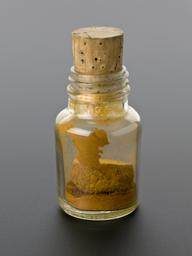

Isolation chip, known as iChip, for isolation of microorganisms that cannot be cultivated using conventional microbiological techniques using an array of 384 miniature diffusion chambers, based on an idea by Slava Epstein and colleagues at Northeastern University, made by HI-TECH Manufacturing, United States, January 2010
The iChip is a low-tech solution to the problem of isolating of microorganisms that cannot be cultivated using conventional microbiological techniques using agar and Petri dishes. Each of the tiny 384 wells in each chip are filled with samples of soil that have been mixed with agar and diluted to ensure that only one cell ends up in each chamber and are placed back in soil to grow.
Slava Epstein and his colleagues at Northeastern University, who developed the iChip, used versions of the device to find 100,000 types of bacterium including a potentially new class of antibiotics called teixobactin in the soil of a field in Maine in 2015. This is the first new class of antibiotics for 30 years, at a time when antibiotic resistance is a growing health issue.
Details
- Category:
- Biotechnology
- Object Number:
- 2020-26
- Materials:
- polyoxymethylene
- Measurements:
-
overall: 80 mm x 15 mm x 15 mm, .02 kg
- type:
- laboratory apparatus
- copyright:
- Unknown Copyright holder
- credit:
- On loan from Northeastern University, Boston, USA



